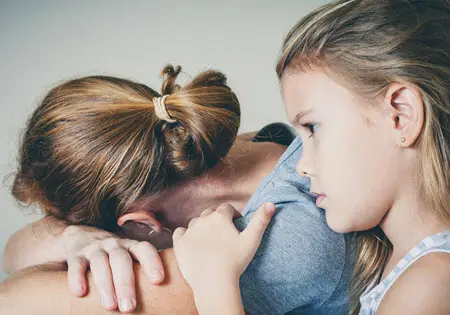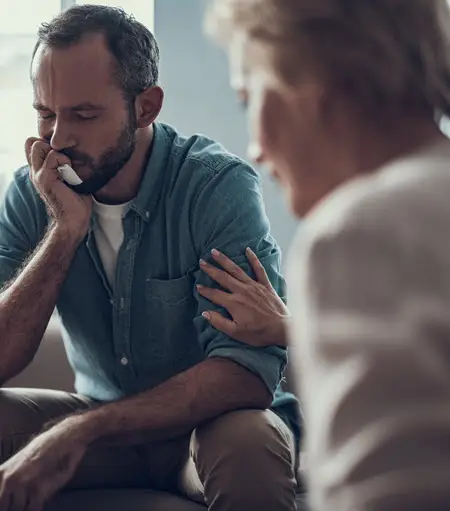Trauma Therapy
Trauma Therapy
“Trauma creates change you DON’T choose. Healing is about creating change you DO choose.”
– Michelle Rosenthall
Trauma is different for everyone…
… but it shares a common theme.
Traumatic events can range from something upsetting to more extreme situations. In general, it doesn’t matter what defines your trauma.
What matters is that something happened (or didn’t happen) in your life, and it is causing you emotional distress.
Some examples of traumatic events include bullying, being involved in an accident, having an illness or injury, losing a loved one, natural disasters, or going through a divorce.
However, it can also include traumatic experiences such as childhood sexual abuse, physical abuse, and rape.

A trauma response can result from one or multiple devastating traumatic experiences…
… or from long-lasting repetitive events. Trauma can affect us in many ways, ranging from subtle to harsh.
The reason why we all respond to traumas differently has something to do with our past experiences and how our brain processes the traumatic event.
We all view our worlds, including traumas, through our own lens. For example, someone who is in a minor accident may walk away and be unaffected by that event. Contrast this with someone who is in a similar minor accident who lost a parent in an accident.
Just remember… it doesn’t matter whether others define your experience as traumatic; the only thing that matters is how the event has been negatively impacting your life and ability to feel happiness.
One thing we know, though… is that no matter the trauma, it changes us in significant ways.

The significant ways that trauma changes us…
- anxiety and panic
- avoidance of situations that remind you of traumatic events
- guilt
- intrusive memories
- lack of enjoyment
- nightmares
- scanning your environment for potential danger
- shame
Common feelings related to traumas…
- Desire to self-harm
- Fearful
- Frenzied
- Panicky
- Restless
- Shut down
- Stuck
- Tense
- Withdrawn
Do you look back on your early years and remember being bullied by those who were supposed to be your friends?
Do you avoid familiar places in fear you may run into someone who mistreated you?
Do family gatherings bring up memories of an abusive childhood?
Have you experienced an assault on your body, either in childhood or as an adult?
Do you start to shake and sweat when you drive on an expressway?
Does a thunderstorm bring back memories of the natural disaster you experienced?
Do you feel triggered by experiences that others might not see as a big deal?
But trauma’s influence on your life can also be very subtle…
You might feel a sense of powerlessness over your life.
A trauma is usually experienced as feeling out of control. Often, if there is a person responsible for the trauma, they were the ones in a position of power.
Overall feelings of powerlessness often emerge from being victimized. This can generalize to all areas of life, making it extremely important to get the help you need.
It can impact your overall belief system and the way you view the world.

Most of us can view the world as a generally safe place. When we experience situations that are dangerous and out of our control, this often changes our outlook.
It can have a negative influence on your self-image and sense of self.
The way we see ourselves is often a result of how we have been treated by others. It is important to see beyond our negative experiences, so our true selves can be discovered. Often, we are buried beneath our traumas and feel true joy when we can let them go. Only then will your true beauty emerge.
You may have difficulty trusting yourself and others… or reaching out for and accepting support.
Other’s intentions are often questioned when coming from a history of being hurt. Putting yourself out there and being vulnerable is scary, as you may feel as if you are putting yourself at risk.
Accepting help and support means giving someone a part of yourself by telling your story. This is extremely challenging and often leads to withdrawing from those that can provide the most help.
It can lead to loneliness.
Experiencing a trauma can lead to feelings of loneliness stemming from not wanting to be with others due to the perceived threat of becoming close to someone, thereby putting them in the position of power to hurt you.
It can negatively influence the way you look at your relationships.
Even when your relationships are healthy and nurturing, having unresolved trauma can make it hard to make good use of the emotional support you have.
It’s not just a mental thing. Your body remembers…
While you may be working hard in your daily life to avoid thoughts of your trauma, your body doesn’t forget.
When you perceive a threat, whether it is real or imagined, your instincts kick in along with their attendant physiological responses.
This is to prepare you for FIGHT, FLIGHT or FREEZE.
When this happens, you are no longer thinking with your “human brain.” Instead, you’re driven by your instinctive “animal brain.”
This is why many trauma symptoms feel so physical. Stress-related conditions, such as gastrointestinal issues, headaches, and chronic pain, are sometimes the result of unresolved trauma.

The only way to get through your trauma is to face it head-on.
Our trauma therapists use evidence-based best practices to help you process and overcome the impact that trauma has had on your life.
Alternative Families Cognitive Behavioral Therapy (AF-CBT)
A new intervention used to help better the relationships between children and their caregivers to reduce the chances of physical forms of discipline that lead to trauma.
Clinical Emotional Freedom Technique/Tapping
Clinical EFT utilizes a form of psychological acupressure wherein tapping on specific acupuncture points allows you to rapidly reduce the emotional impact of memories and incidents that trigger emotional distress. By combining elements of exposure, cognitive therapy, and somatic stimulation, you can experience a sense of freedom from the emotional pain associated with traumatic memories.
Cognitive Behavioral Therapy (CBT)
Using this therapy, you will become more aware of your thoughts and beliefs about your trauma and give you practical skills to help respond to emotional triggers in a healthier way.
Eye Movement Desensitization and Reprocessing (EMDR) and Body-Oriented Approaches
Recent studies have found that body-oriented approaches such as EMDR and mindfulness are powerful tools for helping the mind and body reconnect after a trauma.
During EMDR therapy sessions, small doses of trauma are relived while your eye movements are directed by the therapist. It is effective because your attention is diverted, and the memory is adjusted.
Trauma-Focused Cognitive Behavioral Therapy (AF-CBT)
During trauma processing sessions, the patient and therapist will go through details of the trauma and repeat them until the memories carry no power. This is done in various formats, including a whisper, listening to the recorded memory, saying it aloud, and other creative methods. This changes the brain pathway of the traumatic memory.
Polyvagal Theory
Polyvagal theory provides a framework for clients to deeply understand how trauma has changed their physiological response to the world. With a greater understanding of how their nervous system is reacting to situations when they feel threatened/unsafe (even when there is not apparent danger), they can learn to mindfully attend to their body sensations and/or their social nervous system, helping them regain a sense of calm and safety in the here and now.
Progressive Counting
During Progressive Counting sessions, small doses of trauma are relived while the therapist counts in various ways. It is effective because your attention is diverted to the counting and the memory is altered.
Virtual Reality Exposure Therapy (VRET)
By utilizing today’s technology, traumatic memories can be confronted within the safety of the therapy office. The use of virtual reality goggles helps ensure the environment can closely resemble many situations that mimic those in which trauma occurred. This can lead to quickly modifying pathways that cause the symptoms related to trauma.
It’s time to stop being a victim… and start being a SURVIVOR!
Frequently trauma survivors have other mental, emotional, and relational problems that either pre-dated trauma or develop because of trauma. We know just how difficult it can be living with trauma – how it’s linked to anxiety, depression, obsessive-compulsive disorder (OCD), panic disorder, post-traumatic stress disorder (PTSD), substance abuse, eating disorders, and social anxiety. The list can go on…
Together, we can solve the puzzle of how past trauma is affecting your present life. Even if you’re “functioning well” and living a very productive life, we know that you still might be suffering on the inside.
The negative effects of trauma have stayed with you long enough.
Give yourself the gift of healing, and give us a call today: (305) 662-2686



